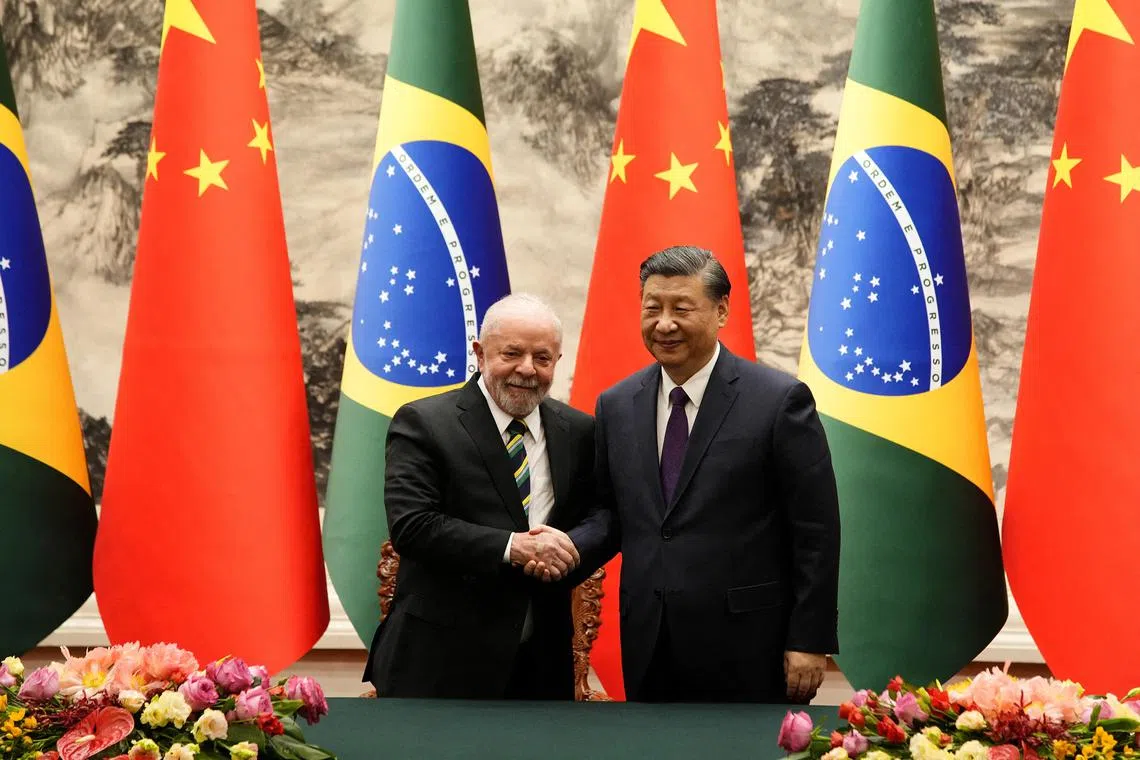China hosts Latin American, Caribbean nations amid US trade war talks
Sign up now: Get insights on Asia's fast-moving developments

Brazilian President Luiz Inacio Lula da Silva meeting Chinese President Xi Jinping after a signing ceremony in Beijing on April 14, 2023.
PHOTO: REUTERS
BEIJING – China will host a summit that includes its key Latin American trade partners this week in an effort to advance influence and partnerships in the region, as Beijing and Washington try to defuse their trade war.
Latin American and Caribbean officials including the presidents of Brazil, Colombia and Chile are set to attend the China-Celac Forum ministerial meeting in Beijing on May 13.
Bilateral trade with the bloc was worth US$427 billion (S$554 billion) from January to September 2024, according to Chinese data.
China’s President Xi Jinping will deliver a speech to the summit. The last time Mr Xi addressed the forum was at the first such meeting 10 years ago.
The China-Celac Forum challenges longstanding American geopolitical and economic dominance in the region, which the Trump administration has sought to counter, and takes place after a weekend of high-stakes trade talks between the US and China that ended on a positive note.
American officials touted a “deal” to reduce the US trade deficit, while Chinese officials said both sides had reached “important consensus” and agreed to launch another new economic dialogue forum. Both countries were expected to release a joint statement on May 12.
China has been trying to marshal a global coalition against what it called an “abuse of tariffs” by the United States.
Since the world’s two largest economies imposed steep tariffs well above 100 per cent on each other’s goods in April, China has reached out to South-east Asia and Central Asia calling on its trade partners to hold the line against “unilateral bullying” and to uphold multilateralism.
China also made progress on trade issues with the European Union, agreeing to discuss setting minimum prices on Chinese-made electric vehicles.
The China-Celac Forum has been a vehicle to deepen dialogue between China and Latin American and Caribbean nations over trade, investment and infrastructure cooperation under Beijing’s Belt and Road Initiative (BRI).
Highlighting tensions between China and the US in the region has been the Panama Canal, which US President Donald Trump has threatened to take back
The US-based BlackRock consortium’s US$23 billion deal to acquire Hong Kong-based CK Hutchison’s port operations near the Panama Canal, which Mr Trump hailed as “reclaiming” the waterway, triggered Beijing’s concerns and prompted a regulatory review.
Commodities trade
China is the primary buyer of raw materials from Latin America, including copper, iron ore and minerals, but its trade with Brazil could feature this week.
Coinciding with the summit, Beijing will also welcome Brazilian President Luiz Inacio Lula da Silva on a state visit on May 13. More than a dozen bilateral signings are expected.
China is Brazil’s largest export market by some length, a trade dominated by commodities like soya beans, iron ore and crude oil.
In 2024, China bought US$37 billion worth of soya beans from Brazil, making it China’s primary soya bean supplier as the world’s largest soya bean buyer diversifies away from the US.
China resumed imports of Brazilian soya beans last week from five firms previously suspended over phytosanitary concerns.
In a social media post, Chilean President Gabriel Boric confirmed attending the summit in Beijing and said he would be meeting President Xi.
The meeting could discuss business interests from Chinese firms in the world’s No. 2 lithium producer after metals group Tsingshan said it remains keen on investment opportunities in Chile’s downstream lithium sector.
On other fronts, more infrastructure cooperation could be highlighted as the high-profile meeting paves a path towards the Brics summit to be hosted in Rio de Janeiro in July.
Unlike Panama, which exited the BRI earlier in 2025, Colombia has ambitions to join China’s flagship BRI programme. It will be following the footsteps of Peru, where the BRI-linked Port of Chancay was inaugurated half a year ago to serve better maritime connectivity between China and South America. REUTERS


